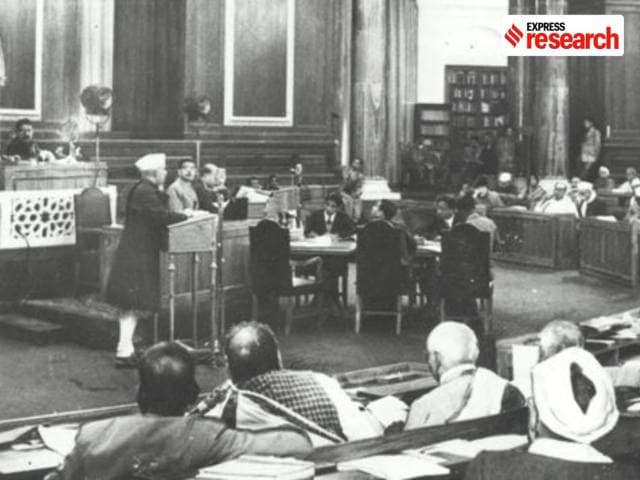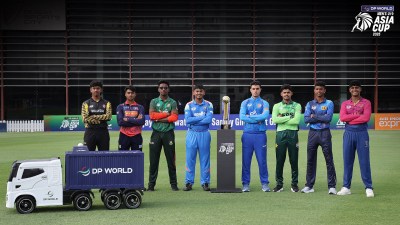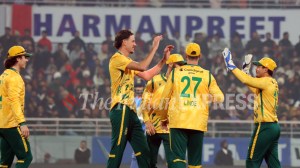How the Constituent Assembly debated over ‘God’ in the Constitution
The Constituent Assembly of India debated the role of religion and God in the Constitution on October 17, 1949. The discussions highlighted the complexities of India's diverse religious landscape and the perspectives of its members about the place, politics and semantics of God. The Assembly ensured that the religious freedom for all should not be monopolised by the religious rights of the majority.
 Jawaharlal Nehru addressing the Constituent Assembly members. (Wikimedia Commons)
Jawaharlal Nehru addressing the Constituent Assembly members. (Wikimedia Commons)On October 17, 1949, an extremely strange and ominous incident occurred in the Constituent Assembly. Until now, the name of ‘God’ had been invoked in the Constituent Assembly nearly 300 times. The number would go on to exceed 350 by January 24, 1950, which was the last day the Assembly sat in session. October 17 was itself characterised by an abundance of such invocations. To use a current legal expression, these signified polyvocal affirmations and disavowals — at times both — of that elusive entity.
Before this article proceeds, it is essential to note that the author of this article is not a legal expert but a historian. His narratology should be evaluated in this light. Furthermore, this article will not conclude by proposing that the name of ‘God’ should not be taken in vain, or that his, or her, or their name is always democratically accessible to all. Rather, it ends on a paradoxical note or indeed a question: how could the overseers of a Constitution so secular in spirit and intent (with or without the 42nd amendment to its Preamble) fail to crystallise a singular definition of what God and religion constituted or what they did not constitute?
What follows answers this by way of a chronicle of real exchanges from the Constituent Assembly Debates on that eventful — or as some would describe — fateful day in the house.
In the name of God or Goddess?
October 17, 1949 may well have been an ordinary day in the affairs of the Constituent Assembly. The inflection point seems to have been an amendment proposed by Maulana Hasrat Mohani, a former president and member of the Muslim League, who chose to resign from the League and live in independent India after the Partition of 1947. Mohani was also famous for having authored the ghazal ‘Chupke Chupke Raat Din, Aansu Bahana Yaad Hai’ (later immortalised in Ghulam Ali’s voice) and is also credited for having coined the slogan, ‘Inquilab Zindabad’ (‘Long Live Revolution!’) back in 1921. The Maulana’s proposed amendment sought “to adopt the same conciliatory attitude to all political minorities and to adopt the same principles as have been adopted by the Soviet Union” (CAD, Book 5: 437). Accordingly, his question was whether the following amendment could be prefixed to the existing Preamble to the Constitution: ‘We, the people of India, having solemnly resolved to constitute India into a Union of Indian Socialistic Republics to be called U.I.S.R. on the lines of U.S.S.R’ (CAD, Book 5: 437). The proposed amendment was promptly negated. However, Mohani had initiated a conversation of paramount significance, whose political currency continues well into the twenty-first century — on the question of where the Constitution of India stands with respect to religion and religious minorities.
 The preamble in the Constitution of India (Wikimedia Commons)
The preamble in the Constitution of India (Wikimedia Commons)
Following Mohani’s unsuccessful proposition, HV Kamath (Member from Central Provinces and Berar) rose to move his ‘Amendment No. 430’. This was on lines similar to the amendment proposed by the Maulana, except it desired to take it a step further. Kamath’s amendment sought to introduce the words ‘In the name of God’ before ‘We, the People of India’ in the Preamble. The President reminded the Assembly of the Schedule III, which gave members the choice to ““Swear in the name of God” or “Solemnly affirm” so as to give freedom of choice to the believers and the non-believers.” This was the President’s polite way of suggesting to Kamath ‘not to insist upon’ moving his amendment. The President was followed by Purnima Banerji (Member from the United Provinces) who requested the Assembly not to make “the matter of God … the subject of discussion between a majority and a minority” as for both “believers and nonbelievers, it will be difficult to affirm or deny God.” Not only was it unproductive “to invoke His name in vain,” but, according to Banerji, God was “an Impartial Entity and He should be allowed to remain so,” and therefore she appealed to Kamath “not to put us to the embarrassment of having to vote upon God” (CAD, Book 5: 438).
Kamath proceeded to move the amendment, all the same.
A Thanu Pillai (Member from Travancore and Cochin State), a self-confessed “staunch believer in God”, rose to a point of order. He argued that if the amendment was accepted, it would “amount to compulsion in the matter of faith” that would, in turn, affect “the fundamental right of freedom of faith,” which stipulated that Indian citizens had the “right to believe in God or not, according to the Constitution.” As Kamath continued to defend his position, Rohini Kumar Chaudhury (Member from Assam) rose to ‘move an amendment’ that instead of ‘In the name of God,’ the Assembly should put to vote the prefix ‘In the name of Goddess’. The Assembly broke into laughter even in that very serious hour. Chaudhury’s suggestion was not entirely ironical, for reasons that he would soon clarify (CAD, Book 5: 439).
‘Do Them as an Offering to Me’
Meanwhile, Kamath was intent on creating history. “In this august House, the first Constituent Assembly of India, of our Bharata Varsha,” he went on, “which has through the ages renewed itself at the Divine Fountain, let us consecrate this Constitution by a Solemn dedication to God in the spirit of the Geeta: “Yatkaroshi yadashnasi Yajjuhoshi dadasi yat Yattapasyasi Kaunteya Tatkurushwa madarpanam” [Whatever you do, whatever you eat, whatever you offer as oblation to the sacred fire, whatever you bestow as a gift, and whatever austerities you perform, do them as an offering to Me].” Kamath’s words projected India and “her people” as manifestations of an “ancient civilization” (CAD, Book 5: 440). In this, he was seconded by VI Muniswamy Pillay (Member from Madras).
M Thirumala Rao (Member from Madras) called Kamath’s amendment “unfortunate”, for it should not have been “subjected to the vote of a House of three hundred people whether India wants God or not.” His fellow member from Madras, B Pattabhi Sitaramayya, suggested that the amendment be promptly “disposed of” (CAD, Book 5: 441). Hirday Nath Kunzru, the prominent freedom fighter, and member from United Provinces, called it “a matter of the deepest regret that a matter that concerns our innermost and most sacred feelings should have been brought into the arena of discussion.” He saw the amendment as being “inconsistent with the Preamble, which promises liberty of thought, expression, belief, faith and worship to everyone.” Accordingly, invoking the name of God could easily translate into a “narrow, sectarian spirit, which is contrary to the spirit of the Constitution” (CAD, Book 5: 441). Chaudhury, who had earlier, mock-seriously proposed adding the name of the ‘Goddess’ to the Preamble, reinforced Kunzru’s sentiments. He claimed to have been “very sadly disappointed” by the amendment, and the fact that his belief “in a Goddess” was met with ridicule by members who seemed to express support towards the God-amendment. “I belong to Kamrup where the Goddess Kamakhya is worshipped,” added Chaudhury (CAD, Book 5: 441). When an ‘Honourable Member’ interjected to argue that “God includes Goddess”, the President astutely observed that it was “bad as it is that we have brought in the name of God in our discussion. We should not become flippant about it” (CAD, Book 5: 441).
BR Ambedkar stoically suggested that Kamath “may be asked to withdraw” the amendment. The latter was firm in his resolve. The matter was put to vote, and the Assembly voted against Kamath’s amendment, 68 to 41. “This, Sir, is a black day in our annals,” remarked an indignant Kamath. “God save India” (CAD, Book 5: 442). But the matter was far from resolved.
Neither a Godly nor a Gandhian Constitution?
Shibban Lal Saksena (Member from Central Provinces) begged to move the next amendment, which proposed to add to the Preamble:
In the name of God the Almighty, under whose inspiration and guidance, the Father of our Nation, Mahatma Gandhi, led the Nation from slavery into Freedom, by unique adherence to the eternal principles of Satya and Ahimsa and who sustained the millions of our countrymen and the martyrs of the Nation in their heroic and unremitting struggle to regain the Complete Independence of our Motherland … (CAD, Book 5: 444).
Brajeshwar Prasad (Member from Bihar) opposed the amendment on grounds that the Indian Constitution was “not a Gandhian Constitution” (CAD, Book 5: 445). Meanwhile, that day itself, Prasad’s own amendment, that of including the phrase ‘secular cooperative commonwealth to establish socialist order’ was also negatived on grounds that it attempted “at making the Constitution a socialist instead of a liberal democratic document” (Jha 3175). Be that as it may, following Prasad’s objection, JB Kripalani, member from United Provinces, tried to impress upon Saksena that it was “not behaving us to vote on this amendment. We must be very sparing of the use of the name of the Father of the Nation.” It would only be consistent, therefore, with the love and respect that the Assembly had for Gandhi that his name be not incorporated “into this Constitution that may be changed and reshaped at any time” (CAD, Book 5: 445). Saksena saw merit in withdrawing his amendment. However, Govind Malaviya, who was awaiting his turn, now moved his amendment, which sought to introduce:
By the grace of Parameshwar, The Supreme Being, Lord of the Universe (Called by different names by different Peoples of the world). From Whom emanates all that is good and wise, and Who is the Prime Source of all Authority, We the people of Bharata (India). Humbly acknowledging our devotion to Him, And gratefully remembering our great leader Mahatma Mohandas Karamchand Gandhi and the innumerable sons and daughters of this land who have laboured, struggled and suffered for our freedom, And (CAD, Book 5: 445).
Story continues below this ad
Malaviya’s amendment was negatived on account of both ‘Parameshwar’ (God) and Gandhi being ruled out as possible entries into the Preamble by the rulings on the previous amendments. Later, that day, Kripalani outlined that the Assembly’s decisions on matters of religious freedom “were not deviating from the basic principles which we have laid down in the Preamble” (CAD, Book 5: 452). In one way, Kripalani’s words anticipated what would later come to be known in another context as the doctrine of the ‘basic structure of the Constitution’ — as codified in the Supreme Court ruling in the Kesavananda Bharati case (1973) — implying that the Constitution had a soul that could not be altered.
Not a ‘secular’ Constitution either?
On November 25, Jagat Narain Lal (Member from Bihar) expressed his dissent towards the “avoidance of the name of God” in the discussions that ensued on October 17. As he reminded the Assembly, foreign Constitutions, including the Constitution of South Africa, for instance, acknowledged ‘Almighty God.’ Thus, India, “which has always remained religious and has retained its spiritual character and which has produced one of the greatest spiritual personalities in the world in modern times too,” should have introduced “the name of God” in the Preamble, according to Lal. Furthermore, he argued, “the words ‘secular State’ should not have come into the Constitution.” Thus, arguably, if the Constitution read that “the State should not interfere with any religion” or “that the State should have a spiritual and moral outlook, instead of saying that it should be secular,” a “lot of misunderstanding” could have been avoided (CAD, Book 5: 948).
Lal’s argument becomes more significant if seen in the light of his fellow member from Bihar, PK Sen’s comments from November 23. According to Sen, it was a gross misconception to think that “all contact with God or religion has been, as it were, abandoned by it, as if it is a godless Constitution, as if by calling it a Secular Democratic Republic it has actually become secular or godless.” In Sen’s reading, the Constitution had not “banished religion” or that “innermost faith of man in a Providence that shapes our ends and our personal relationship between us and our Maker.” Rather, the Constitution had “banished religions, that is to say the conflict between one religion and another.” In other words, the Indian Constitution recognised that ‘all religions are true, that not only is there an essence of truth in all religions but that all religions are divinely sent and dispensations of God, can there be any difficulty whatsoever, can there be any conflict whatsoever between one religion and another.’ Sen’s plea in favour of recognising the pluralism of the Indian Constitution ended with the somewhat radical recommendation that, in the foreseeable future, “the word ‘secular’ may … even be removed from the Constitution” (CAD, Book 5: 831).
Does India want a Constitutional ‘God’?
The aforesaid chronicle — though potentially unfinished and broadly delineated — lends itself to some pressing inferences of great contemporary relevance. First, India’s constitutional parents sought to uphold the Constitution’s durability even if that required “deliberate (and necessary) ambiguity in dealing with potentially explosive issues of religious identity” (Chiriyankandath 2008). Second, the proceedings of October 17, 1949, call for a larger survey of the place, politics, and semantics of ‘God’ within the Constituent Assembly Debates, with a view to deriving what has been recently identified as “a religious jurisprudence” in Constitutional Law (Kishore 2020). This recalls former Solicitor General of India, Justice Rohinton Fali Nariman, terming the Constitution as “our holy book”. Third, the Assembly was perspicacious enough to see that the concept of religious freedom for all should not be monopolised by the religious rights of a majority of Indians. Finally, especially when seen in the light of India’s twenty-first century religious awakening, revolving around the politicisation of Hindu rights, a lot of its intellectual fodder and its antitheses find robust representation in the Assembly Debates from over 70 years ago.
It would be churlish not to feel roused to study the Assembly Debates for a deeper analysis of how the drafters of the Constitution saw God. As renowned jurist Granville Austin said back in 1966; “One test of a constitution is whether it can provide a durable framework for government in the midst of great social and economic change. This, the Indian Constitution has done so far” (Austin xiii). However, as calls for amending the Constitution grow more resolute and diversified, how far the Constituent Assembly Debates can themselves guide us — especially with regard to whether ‘India wants [a constitutional] God’ — is yet to be seen.
Arup K Chatterjee teaches at O P Jindal Global University and is the author of The Great Indian Railways (2018), Indians in London (2021) and Adam’s Bridge (2024).
References
Austin, Granville. The Indian Constitution: Cornerstone of a Nation. Bombay: Oxford University Press, 1966.
Chiriyankandath, James. “‘Creating a secular state in a religious country’: The debate in the Indian constituent assembly.” Journal of Commonwealth & Comparative Politics 38.2 (2000): 1-24.
Constituent Assembly Debates, Book 5. Volume X—6th October to 17th October 1949; Volume XI—14th to 26th November 1949; Volume XII—24th January 1950. New Delhi: Jaico, 2014.
Jha, Shefali. “Secularism in the Constituent Assembly Debates, 1946-1950.” Economic and Political Weekly 37.30 (2002): 3175-3180.
Kishore, Pranjal. “Law and Faith: Constitution as the Touchstone for Interpretation.” The Hindu Centre for Politics and Public Policy, January 6, 2020. https://www.thehinducentre.com/the-arena/current-issues/article30275265.ece#sixteen16.
- 01
- 02
- 03
- 04
- 05































